The Warrior and the Poet seem, to our modern minds, to be two wholly different archetypes. Yet the idea of the Warrior Poet is found in many cultures, both Eastern and Western. When I was eight years old, my own grandfather introduced me to one of the greatest warrior poets of all, the Icelandic skald Egill Skallagrímsson. Egill is said to have recited his first kvad at the age of 3, and to have made his first kill at the age of 7.
At one time, the Norwegian king Eric Bloodaxe wanted his head. Egill used the night before his execution well, by composing a salutatory poem in honour of the king. When King Eric heard the poem, he spared Egill’s life. I remember my grandfather telling me that story, and I remember thinking: «I want to be able to do that one day.»
War Stories
For more than five years now, I’ve been working closely with Amir Mirzai and his stories of strife, horror and brotherhood from the Iran-Iraq-war. In those years, «Krigsfortellinger» or «War Stories» has been performed all over Norway, in schools and theaters and as a part of festivals and seminars. But never outside the country’s borders. Until now. The 28th of July we premiered the English version of our documentary show at the 15th Folktales and Storytelling Festival in Kea, Greece.
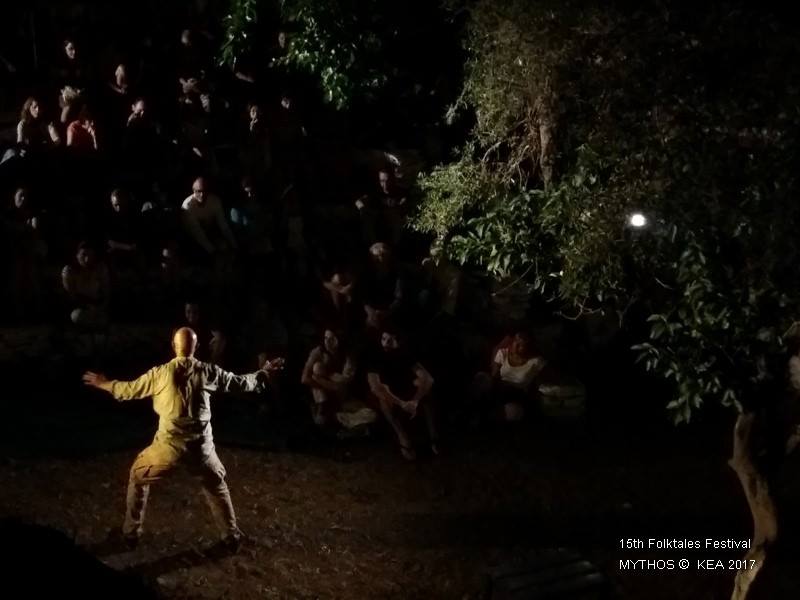 We got more than we’d bargained for. Our stage was an outdoor theatre in the city of Ioulis. We had no mic, and both barking dogs and an incessant symphony of crickets were colouring the soundscape around us. They did settle down as we were beginning the show, however.
We got more than we’d bargained for. Our stage was an outdoor theatre in the city of Ioulis. We had no mic, and both barking dogs and an incessant symphony of crickets were colouring the soundscape around us. They did settle down as we were beginning the show, however.
But a far greater competitor was the unannounced wedding just above us where about a hundred people started dancing to the cheerful music of a band which did have a mic or two. As our story became darker and more calm, they grew lighter and more cheerful. To top it up, the stage floor was natural soil, with dry grass and earth. The war scenes we portrayed felt suddenly even more realistic to us, as we threw ourselves down into the dirt. I felt like I was there with Amir on the battlefield, truly there in a way I’ve never felt before, and I also managed to get some dust in my throat, impairing my already straining voice.
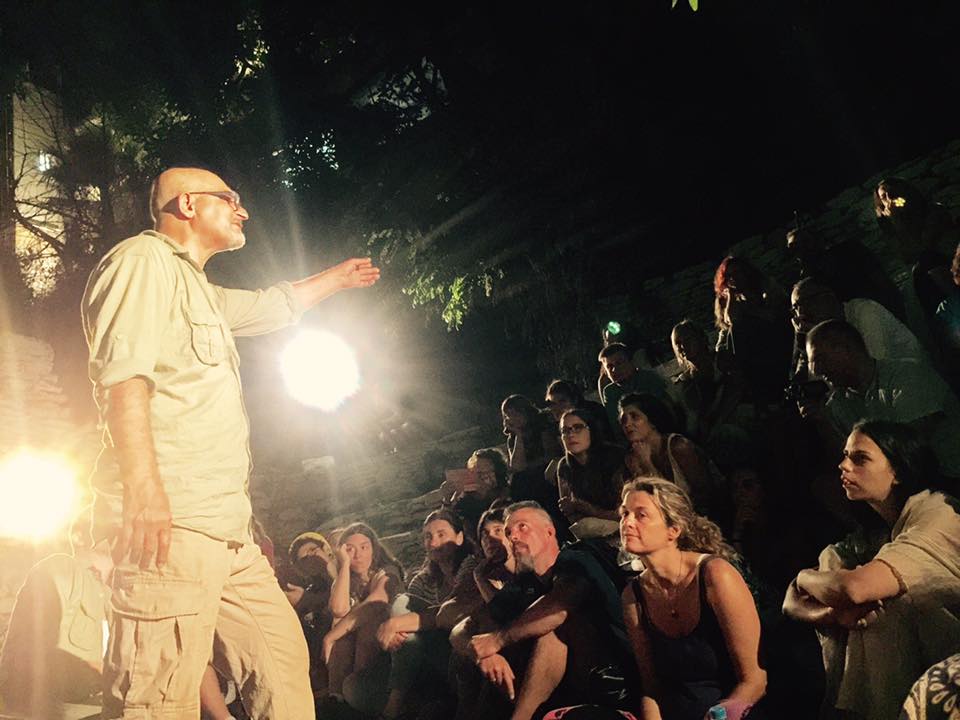 We were, to put it simply, at war.
We were, to put it simply, at war.
Towards the end of the show, the audience really struggled to hear us, we had to bring them down on to the stage, closer, around us. But the funny thing was, all of these setbacks, these challenges, only served to heighten the energy and the intensity of the show. The audience told us afterwards that they strained their ears to hear, that all the disturbance only enhanced their focus and gave the entire performance a nerve, a stronger quality.
The context became part of the experience. Truly a once-in-a-lifetime experience with unforgettable moments. Not to mention the added detail of the Orthodox priest who hunched down on a plateau above us like a silent gargoyle throughout the performance.
I don’t know why I, as a pacifist with no weapon experience outside wooden swords and plastic guns, feel so connected to Amir’s tales of war and battle. Maybe because he has opened his life up to me in such a way that I feel as if his story is my own. Maybe because you can still embody the warrior archetype without resorting to violence and domination. I don’t know.
What I do know is that in the battlefield of ideas that is our present concept of a civilization, the stories we tell shape our perception of the world. War and conflict is a reality for many. By understanding it and showing what it does to us, by personifying the suffering of others and taking it in, maybe we, as poets, can help transmute war into love.
Before going to Kea, I was interviewed in the festival’s online column Let the Tellers Tell about myself as an artist and also my work with War Stories and Amir. The responses were put up in Greek. Here is the English version:
You are also known as “The Jack of Clubs”. How is this aka linked to you as a person and as a storyteller?
Both my grandfathers were storytellers, if not by profession, then by nature. I had a special relationship to my mother’s father – he told me a story from the Norse Sagas when I was eight years old – about the infamous warrior poet Eigil Skallagrimsson and how he was captured by an enemy king who wanted his head in the morning. All through the night, Eigil composed a salutatory poem to the king which he performed just before the executioner’s axe would fall. The king was so amazed and pleased with it, that he let Eigil go. I remember thinking: “I want to be able to do that some day”.
My mother’s father – Harald Mellum – would also tell me stories from his own life, usually connected to his amazing luck and sense of dramaturgy. A story he particularly liked telling was one which took place a cold February morning in the 60s when he, as an air force captain in the Norwegian base of Gardermoen went inside the officer’s mess hall and wiped the snow off his coat. He saw a corporal playing solitaire by the fireplace. Gripped by a sudden impulse, my grandfather Harald went over to him and said: “Put that deck down!” The corporal obeyed the strange order. Harald then shuffled the cards together, set down the deck and said: “Now I’ll pull out the Jack of Clubs for you.” He cut the deck and there it was! Now, my grandfather didn’t pull a trick, he just had a feeling and went with his blind luck. “How on Earth did you do that?” asked the corporal. “Well, I said I would, so I had to!” replied my grandfather before his innate sense of dramaturgy prompted him to exit the mess hall so that people could get something to talk about.
When my grandfather was dying, we had many open and frank conversations. I understood that he had deep down wanted to be an actor and a poet, and he gave me a folder of musings and writings he had done with the title: “Harald Mellum’s diverse exploits and mistakes” and asked me to finish it. Five years after his death, I realised that I maybe wasn’t supposed to finish the folder as such, but make a performance about him and our relationship. I titled it “The Jack of Clubs”. Since then, that became my artistic persona.
For me, it both symbolizes the connection to my grandfather, to the stories that he gave me, and to the qualities that are in my blood – but also the Jack of Clubs itself stems from the Tarot card “Knight of Wands” – the Wands being the suit of inspiration, creativity and fire, and the Knight being an active force for committing to action, charging forth with his vision enthusiastically.
2. You have been performing all over the world. How is it to perform in a language and in a culture other than your own?
In a way, wherever you go, you perform in a different culture. Even if it’s only in a new town or context. There are plenty of sub-cultures to go around, even in a small country like Norway, and telling stories for a Norwegian crowd not used to storytelling can feel much more like trying to understand and navigate another culture than performing in a storytelling festival with an audience used to stories in, say, Greece, where I’ve told four times already.
As a storyteller you get used to adapt to and reframe your performances to different contexts – in a sense every single telling requires something else depending on the factors involved. The practice of storytelling also feels very cross-cultural and universally recognizable in itself. I have felt sometimes that I’ve missed the frame, the context, and as such lost the possibility for connection with the audience. It never feels good, but they are also good learning experiences, of course.
As for another language, the only other language I have performed in than my native Norwegian to date, is English. I will always feel more expressive in my mother tongue, though I am fairly fluent in English and I never have to think about the words I’m using. English is a different instrument than Norwegian, and requires a different tuning, a different way of expressing myself. But it also gives new possibilities.
3. Would you consider music as a vital part of storytelling?
Storytelling in itself is a vital part of everything around us. Storytelling is a vital part of civilization, of how we imagine ourselves in the world. In a way, the world came into being through the telling and shaping of stories. To the best of my knowledge, most stories were sung of old, and music and stories were one and the same. Does that answer the question? Maybe not. Maybe I see everything as music, even language.
4. How is your cooperation with Amir Mirzai? In your description of him, you call him «King of Clubs», why is that?
Amir Mirzai is my unlikely brother. We represent two different generations, cultural backgrounds and temperaments. Yet we are of the same heart. Our cooperation really started with the performance “Tales of War” and through that work, he opened up his life to me and invited me, generously, to take part in it. Through our work together, his experiences have in some peculiar way become my own.
The moniker “King of Clubs” is connected to the fact that I feel he shares some of the same qualities as me and my grandfather (see above) but he has travelled farther than me. But it’s not something I call him in my daily life. 🙂 Just a gimmick for my webpage where I try to compare all my colleagues to different playing cards.
5. In “War Tales”, you shall share the stage with Amir Mirzai. What is it like when two storytellers work on the same story?
This story is naturally primarily Amir’s story. It is based on his life and his experiences. He is the protagonist, and I fulfill more a role of witness, of interpreter. A window into his life and a bridge between the audience and Amir’s experiences. When we were working our roles were clearly defined from the start, and we were also inspired by a trait in Persian storytelling tradition where two performers tell the same story but with different, contrasting viewpoints. In our case, Amir represents the viewpoint that the world and himself is broken, while I insist on the existence of hope, of light in the darkness.
While working I have also sometimes felt like an archaeologist. Myself, our creative producer (whose idea started the entire performance) Marie Ulbserg and our director Øystein U. Brager constantly uncovered new stories from Amir’s life as we worked, trying to understand and make sense of how Amir managed to survive what he has gone through, what it has meant for him and what it can mean for us.
6. Is it difficult for a person who has never experienced war to stand next to a person who has survived war and exile and tell «War Stories»?
In the beginning I was often in awe of Amir’s experiences, treading lightly around them, wanting to be respectful and truthful. But Amir quickly told me to stop being so careful and gave me a lot of leeway. Our friendship and connection grew through working with the show, and he gave me insight, almost visceral insight into how his experiences felt and how they affected him. I felt like I was reading a fantastic book where I totally identified with the protagonist, not wanting the book to end. To me it’s not difficult to share the stage and the experiences with him – to me it’s an honour.
7. In your opinion, is war justified to conquer freedom or is peace a universal and all-sacred ideal?
Human history is steeped in conflict. And some of those conflicts and revolutions have arguably brought our societies forward. Even so, to me, war is never justified. It’s the path of least resistance. War is easy. Peace is hard. I believe that humanity is entering into a new Enlightenment, not of the mind, but of the Heart. If we can manage to find peace within, there will be peace without. But it’s up to us. To each and every one of us.
Amir told me a story, an old Persian story: An archer is going through the fields, bow and quiver on his shoulders. He passes some farmers who ask him where he is going. “I am headed for the battlefield to fight in the war” he replies. “To the battlefield?! But your quiver is empty, you have no arrows, how are you going to fight?” they ask him. “No worries” says the archer. “I’ll just wait until they start shooting at me, then I’ll pick up their arrows and shoot them back!” This sets the farmers laughing. “You idiot?! What if noone shoots at you, what will you do then?!” The archer looks at the farmers and says: “If noone shoots at me, then there is no war.”
Breaking the cycle of violence and fear requires strength. That is action. Everything else is reaction.
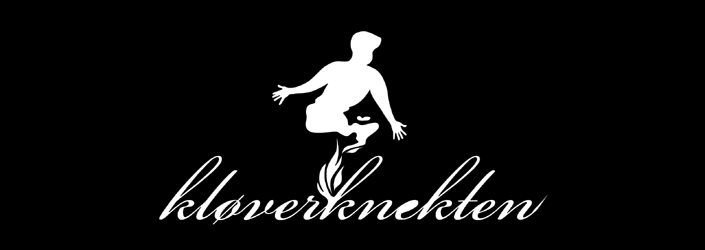
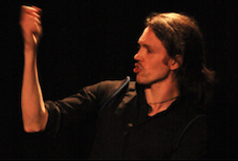

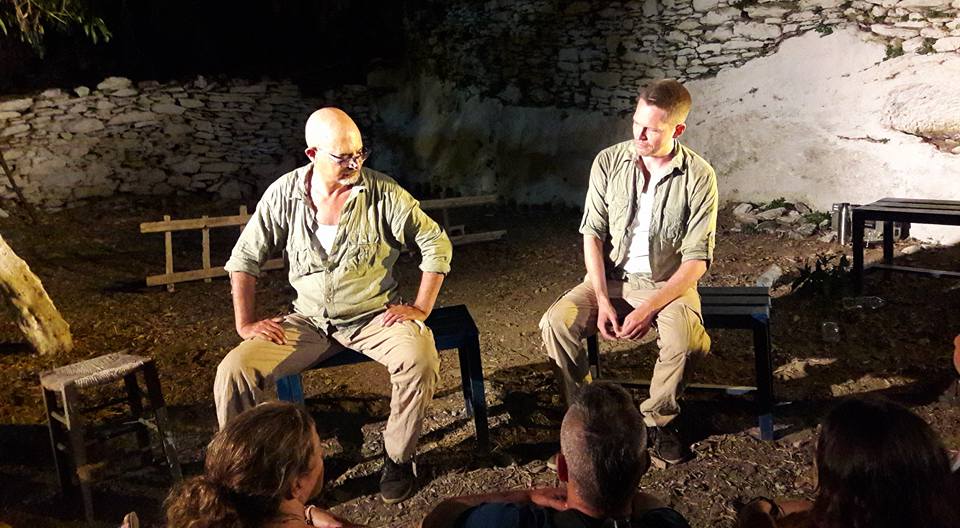
Legg igjen en kommentar